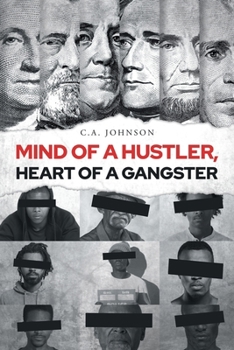Mind of a Hustler, Heart of a Gangster
Select Format
Select Condition 
Book Overview
The C.O.B. organization has quietly been on the rise in the St. Louis underworld. With an ambitious leader and mastermind in Arlo "Stacks" Johnston, there are no limits for the organization. Stacks has the perfect scheme to catapult the organization to the top, as it will gain them unlimited money, power, and respect upon execution.
However, nothing ever goes as planned. Obstacles such as trust and loyalty arise within the organization just as the C.O.B. becomes engulfed in a full-fledged street war among St. Louis's most powerful criminals for territorial seniority, vengeful retaliation, and the root of all evil.
The determination of Stacks will not be deterred as he lets nothing interfere with his plans of finally fulfilling his dream of being the most essential and important person to the criminal world of the Gateway City. Only heaven or jail will stop him. Unfortunately, one will inevitably occur, hailing a devastating blow not only to the C.O.B. organization but also to his wife and children.





















